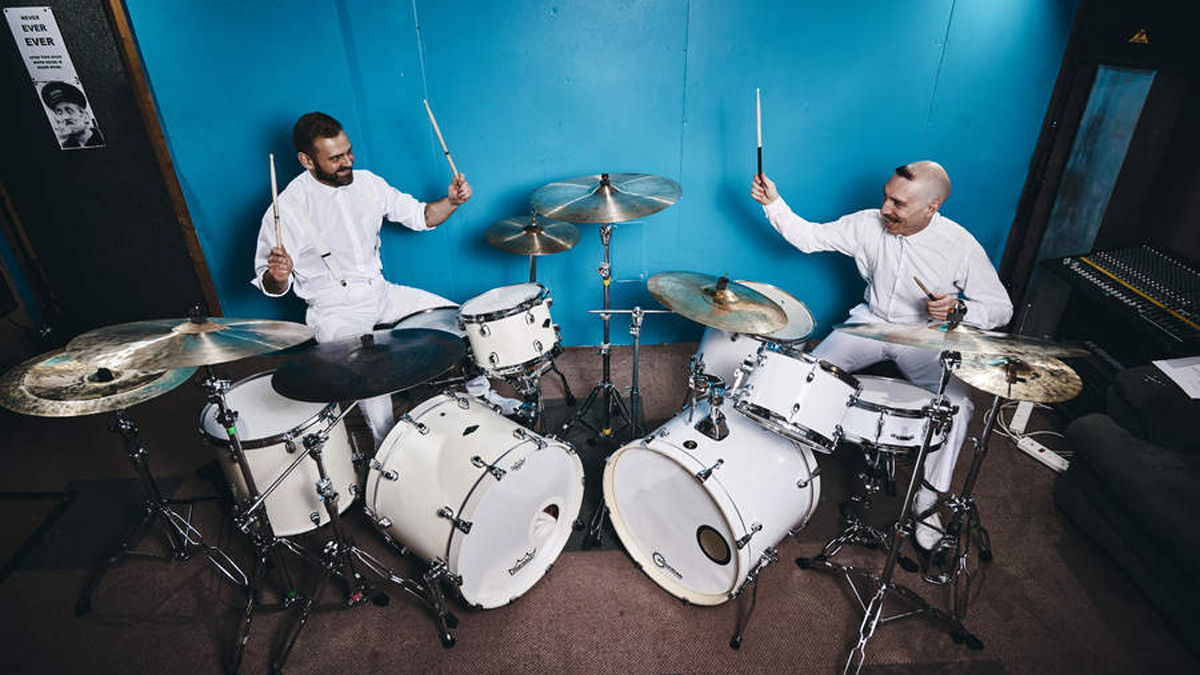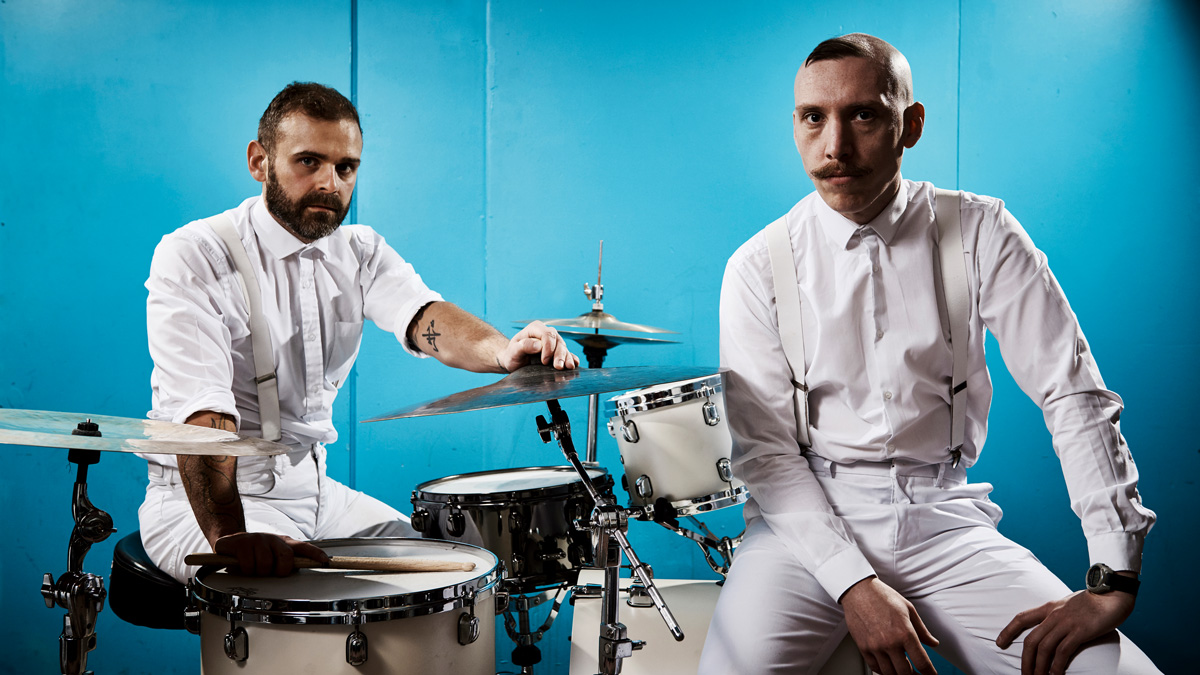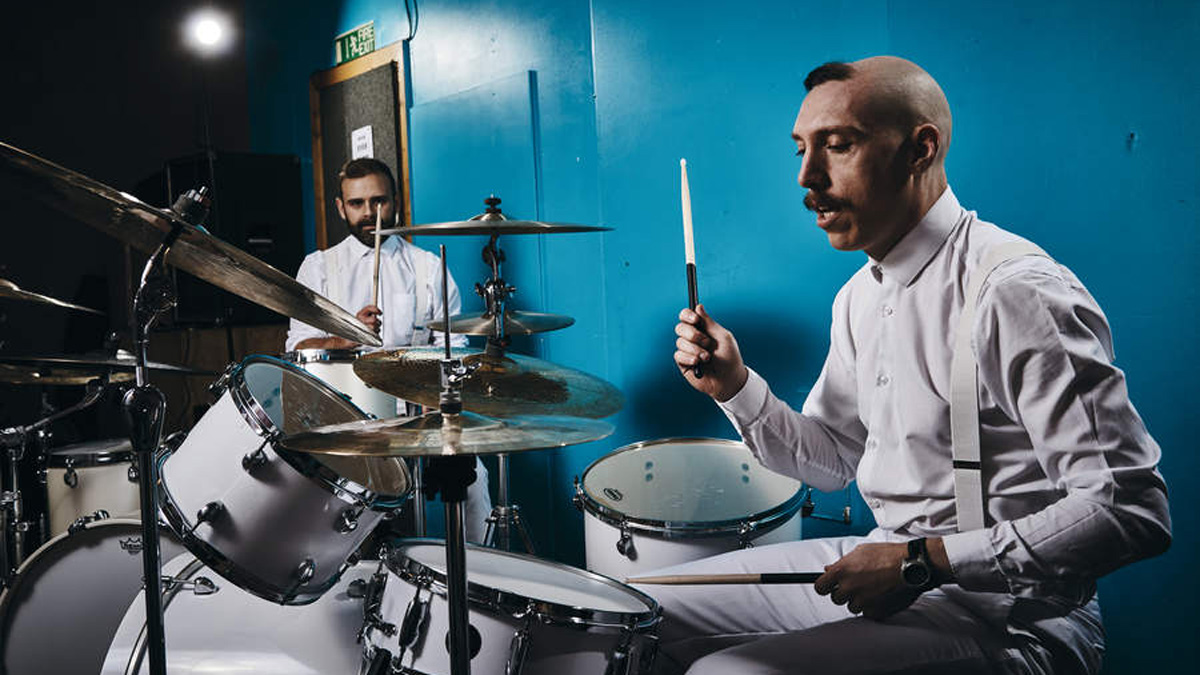Jamie Lenman and Dan Kavanagh talk double drumming and the most exciting beats in British rock
Two players are better than one?

Double drumming!
When ex-Reuben frontman Jamie Lenman found himself with a bunch of songs but no drummer, it was ex-Reuben roadie and Godsized sticksman Dan Kavanagh who suggested they jam.
Despite some of the toughest drumming challenges he’d ever faced, Kavanagh proved himself one of Lenman’s greatest musical allies, helping him complete a wealth of songs, recording the brutal drum parts for two albums - Muscle Memory and 2017’s excellent Devolver - and handling drum duties on the road (where he also sings backing vocals, as if his job wasn’t hard enough).
However this is no ordinary musical pairing. You see, even back in his Reuben days Lenman was the head honcho, controlling everything - including the drums - in order to realise the musical pictures he painted in his brain. While most drummers would never let the guitarist call the shots, Lenman, a long-term Dave Grohl fan, earned his rhythmic stripes playing drums in a number of bands and developed an impressive knack for writing complex, intricate and leftfield beats.
Although short-lived, Reuben were legendary in British rock circles - Lenman’s puppet-master approach clearly worked. When it came to creating the beats for his solo material, it was only going to happen one way - Lenman would conjure drum parts in his head and together he and Kavanagh would bring them to life, however impossible they seemed at first.
Appropriately, Lenman’s newest album Devolver is a drummer’s dream, chock-full of unique polyrhythms, extended drum breaks and slabs of groove underpinning every tune. The album not only showcases Lenman’s drum-writing gift, but also Kavanagh’s potent ability behind the kit and commitment to realising the frontman’s eccentric and sometimes perplexing vision.
We grilled them about making Devolver a reality, the appeal of rhythm and drumming, and their most unconventional of working relationships.
Dan, how did you first get to know Jamie?
Dan Kavanagh: “It was at The Rooms rehearsal studios where I used to work and where Reuben rehearsed. The first time I met them they were writing In Nothing We Trust, around 2006. One weekend they were playing three shows and Jamie asked me to guitar tech for them. I didn’t know anything about guitars, but he said, ‘Just carry a few guitars about!’”
Jamie Lenman: “We worked his way up to tuning guitars. You were a guitar tech first of all, then Guy [Davis, Reuben drummer] was like, ‘Do you want to tech my drums?’ Then you’d drive the van and do whatever needed doing.”
The Muscle Memory sessions with Daniel were probably the easiest I’ve had with a drummer
How did the relationship develop to playing music together?
DK: “After Reuben split up Jimbo had loads of ideas and I casually said, ‘If you want to hook up and go down The Rooms and muck about, it’d be a laugh’. Years later and I’m trying to play The Six Fingered Hand under hot lights. Obviously I was a big fan of Reuben and I knew that whatever Jim’s got in his head is probably pretty f**king decent. Let’s get it out of his system, and I wanted to hear it if nothing else.
“I was never thinking I would record these songs. It was beyond my ability. I called him up and said, ‘Look, you’re going to have to start thinking about who’s going to do [the recording].’ As much as I wanted to do it I was aware that it was going to be terrible on the day. The red light goes on, this is how much it costs per day and I physically couldn’t play some of those beats.”
Ultimately you did end up recording the drums for Muscle Memory though. Did you have much recording experience up to that point Dan?
DK: “No, that’s the first album I tracked.”
JL: “Is it?! Muscle Memory? Thirty songs in two days. F**king hell!”
DK: “I’d done a couple of singles and band demos. I’d been in nice studios a couple of times, so I understood the process, but that had been really easy pop music. I’ve got quite low self esteem as a drummer and I remember being quite anxious about it all. I remember asking Jamie before [the sessions], ‘If we f**k up, do we stop?’ And he said, “No, because you might play something brilliant right after it.’”
JL: “We were both under a lot of pressure, but the Muscle Memory sessions with Daniel were probably the easiest I’ve had with a drummer.”
Did you come out of Muscle Memory with more confidence in your ability, Dan?
DK: “It’s probably something psychological I’ve got. I don’t look at it like I’m onto the next level, I think I should have practised more and that it should have been easier. Saying that, being in a band with him has been, in a drum sense, the best possible education.
“Someone asked me recently what being in a band with you was like. I said he’s demanding but patient. What people don’t understand is that he will stand there for three hours quite happily and let me go around a drum beat until I can play it. I think we’ve got some sort of weird chip missing in our brains that we’ll both just do that!”
JL: “We just like drums man! I’m interested in it. I’m even interested in when people play drums incorrectly. I’m interested in that puzzle. If we’ve got a particularly tough drum beat that I’m trying to get through to Daniel, as adept as he is and however strong our working relationship is, sometimes it just won’t get through and I’m interested in how I can communicate it to him, or how we can unlock things. We’ve gone for hours and we can’t quite get it, and then somehow it clicks. It’s quite exciting.”

Studio self-esteem...
Jamie, drums and rhythm seem to be a thread that runs through all your music, from Reuben up to your solo material?
JL: “Definitely. If I’m not actually physically playing drums, I’m always playing them in my brain, if that makes sense? Even when I’m playing the guitar on my own. It sounds so stupid to say, but I have drums in my head, I’m playing them with my invisible brain-hands when my actual hands are playing guitar.”
What is it about rhythm that sings to you?
JL: “It’s just the basis of everything. I can’t use any better word than foundation. You build everything on top of that. You can’t really start until you’ve got the drums. I’ve always been more interested in drum licks. I’m convinced that Grohl’s Smells Like Teen Spirit beat is more to do with the success of the track than Kurt’s riff. When Dave plays that beat it’s just incredible. More than the vocals and the riff, it gives it a real rhythm. And that’s why it got to number seven in the UK charts, because people could feel that danceability.”
Dan, what do you think makes a good drum beat?
DK: “I think what makes a good drum beat is it being in a good song. There are bits of drumming that amaze me and there are great beats that I love playing, but without having something that it’s a part of… say Song For The Dead by Queens Of The Stone Age. Imagine if that drum intro finished and the guitars didn’t come in, it wouldn’t sound great. I don’t really think much about beats on their own. But ultimately for me it’s feel, that’s what makes a good drummer.”
Jamie, do you write riffs and vocal melodies from a percussive perspective?
JL: “I suppose I do, especially the stuff on this new album. If you listen to something like Mississippi, that riff, and even when it gets going, it’s much more percussive than it is melodic. That’s always been my way. I play downtuned with all the strings set to chords so it’s just one finger at a time. I suppose the guitar parts I write are very rhythmic. In the same way that on The End where all three guitarists in The Beatles have that big guitar battle and you can hear very distinctly which Beatle is which because Paul is very technical, George is very flowery and Lennon’s parts are on one string and it’s about a rhythm rather than going everywhere. I play percussively on the guitar as well; maybe because I’m not that good, but maybe because of that relationship with the drums. That makes me feel better about myself, thanks!”
Jamie, what is it about Dan’s approach to drumming that makes your working relationship click?
JL: “He just never says no. The other drummers I’ve worked with, if you’ve got some big picture in your brain and you say ‘let’s play this’, sometimes they’d go ‘I don’t know’, or they’d go into it half-hearted. I’m sure Dan would agree with me that since he’s been playing with me - and not due to me, he did a long stint in Godsized as well - he’s twice the drummer he was.
“I would suggest things to Guy [Davis, Reuben drummer] that were well within his range and he still might say, ‘I don’t know, I don’t fancy that.’ Because it was an equal partnership he had that right of veto. Daniel ain’t got no rights, so if I say to him, ‘Let’s do this,’ even if it’s well beyond his skillset, he’s like, ‘Let’s see what happens,’ and just go for it. We’d spend a lot of intense nights jamming it out, but we’d get there, to the point where he’s playing things that he was previously incapable of and I couldn’t have achieved with any previous set-up.”
Jamie, what’s your process for coming up with drum parts and is Dan involved in the writing at all?
JL: “Not really. These days I write it all in my brain first, but then it’s good to come to Daniel. I come to practice and I go, ‘Play this, let’s do that, maybe not that there,’ and we go through it until we’ve got what we want. It starts as a full drum beat in my head, but it’s probably got a couple of straggly bits it doesn’t need. Then I like to hear it on the kit with an actual professional drummer playing it. Even if you’ve got it on some nice drum program on your computer, that can’t compete with the feel of a musician. I’ve done demos that I’ve thought are pretty sweet, I’ve taken them to DK and we play it live and it adds a completely different dimension, even though we’re playing exactly the same thing.”
DK: “I get a lot of credit for the drums, which he deserves. He writes it, man. Often we’ll be in a rehearsal room and he’s got a new song and he’s got this apologetic look, because he knows the idea can be done, but he knows it’s going to suck for me. It’s made me an infinitely better musician, not just a drummer. No one’s ever questioned [my playing] in the bands I was in before. To have that dynamic change was obviously good for me. That’s something a lot of musicians are probably too precious about.”
The drum parts on Devolver have a very unique style, clearly meticulously crafted…
JL: “I think I’ve done the most work on drums on Devolver than I have on any other because I knew it was going to be very rhythmically based. You can hear on several of the tracks, either at the start of the song or when the song’s finished, all the instruments cut out and we’ve got 30 seconds to a minute of just the beat carrying on. It’s very beat-led. One of the singles is even called Hardbeat. The guitar parts are the percussion and it’s the drum beat that is the riff really. I worked hard on it, and different permutations of that same beat. I wasn’t sure it was quite possible until me and Daniel worked it out.”

Locking in and tracking live
Are there any specific beats on Devolver that you remember taking a while to chisel down?
JL: “The main beat for Mississippi. It drives the song with all the toms going in and out, but you’ve got to keep that hi-hat constant. That’s always one of my little fetishes. I get p**sed off when someone’s playing 16th beats and they miss one out because they’ve got to hit the snare. Imagine how awesome it would be if you could go right through on the hi-hat. There’s always a way you can get round to things. I thought about how it would be possible in my brain before I got Dan to do it. He just took it in his stride, like he takes everything in his stride.”
DK: “I agree. The bit that probably created the most grief during the whole Devolver process was playing an offbeat hi-hat.”
JL: “That’s really why I’m not such a good drummer, and that’s why I don’t drive a car either, because drummers have got to do four different things with all their appendages. Sometimes contradictory things. And especially because I like to write a lot of poly-beats. Very often your left hand and right hand only match every 12 bars. That’s much more complex than a very loaded, straight part. You sort of have to trick your brain.”
Offbeat hi-hats aside, which beats on Devolver are the most satisfying for a drummer to play, and why?
DK: “Probably Mississippi. I don’t mean the signature beat, I mean the boring bit near the end. I think that’s where the song is at its most powerful. As a fan, that’s the bit of the song I like the most. The bit at the end of Devolver that I struggled with is just heavy, too. It’s not the quickest bit, but it’s weighty, slow and loud.”
JL: “Those bits you picked out are both bits where what I’m playing on the guitar completely locks in. There’s nothing that Dan’s doing with the kick or snare that I’m not replicating.”
Were you breathing down Dan’s neck when he was recording his parts, Jamie?
JL: “Oddly enough, on this record I played live every time with Dan. That was part of the conception of doing it as a two-piece. When we did Mississippi and maybe even Fast Car, I’d do one run-through and [producer] Space would play it through to Kav again, but when we were doing the middle tracks I was having such fun playing it through the studio to Kav. You don’t need a good guitar sound when you’re just doing a guide guitar for the drummer, but because the guitar sound was so good and I could hear the drums through the speakers it sounded brilliant and I wanted to play it again. That’s when I thought that if we could do it with just the two of us it would make for a much more exciting live show, simpler and more fun. From then we tracked everything live.” It must be a different challenge taking this material live?
DK: “It really is. That’s the stuff that I feel more of an accomplishment with. I’m proud of the records because that’s what I always wanted to do, make proper albums. But the stuff we’ve done live? That’s the stuff I actually look back and go, ‘F**king hell, we’re a dangerous band.’ I’ve really played my part in that.
“The live stuff is really challenging, but really rewarding. There’s so much singing as well. That’s a funny thing because I’ve got no right to sing - there’s no lessons or anything there. I had to let go of drumming [to make that happen]. I’m quite surprised about a lot of the stuff I can eventually play and sing, but we’ve discussed before that sometimes you’ve got to make a decision. You can’t be doing that fill and singing that note. Normally we choose the note. That’s such an important point. You want to hear harmony more than the fill.”
I'm MusicRadar's eCommerce Editor. In addition to testing the latest music gear, with a particular focus on electronic drums, it's my job to manage the 300+ buyer's guides on MusicRadar and help musicians find the right gear for them at the best prices. I dabble with guitar, but my main instrument is the drums, which I have been playing for 24 years. I've been a part of the music gear industry for 20 years, including 7 years as Editor of the UK's best-selling drum magazine Rhythm, and 5 years as a freelance music writer, during which time I worked with the world's biggest instrument brands including Roland, Boss, Laney and Natal.
